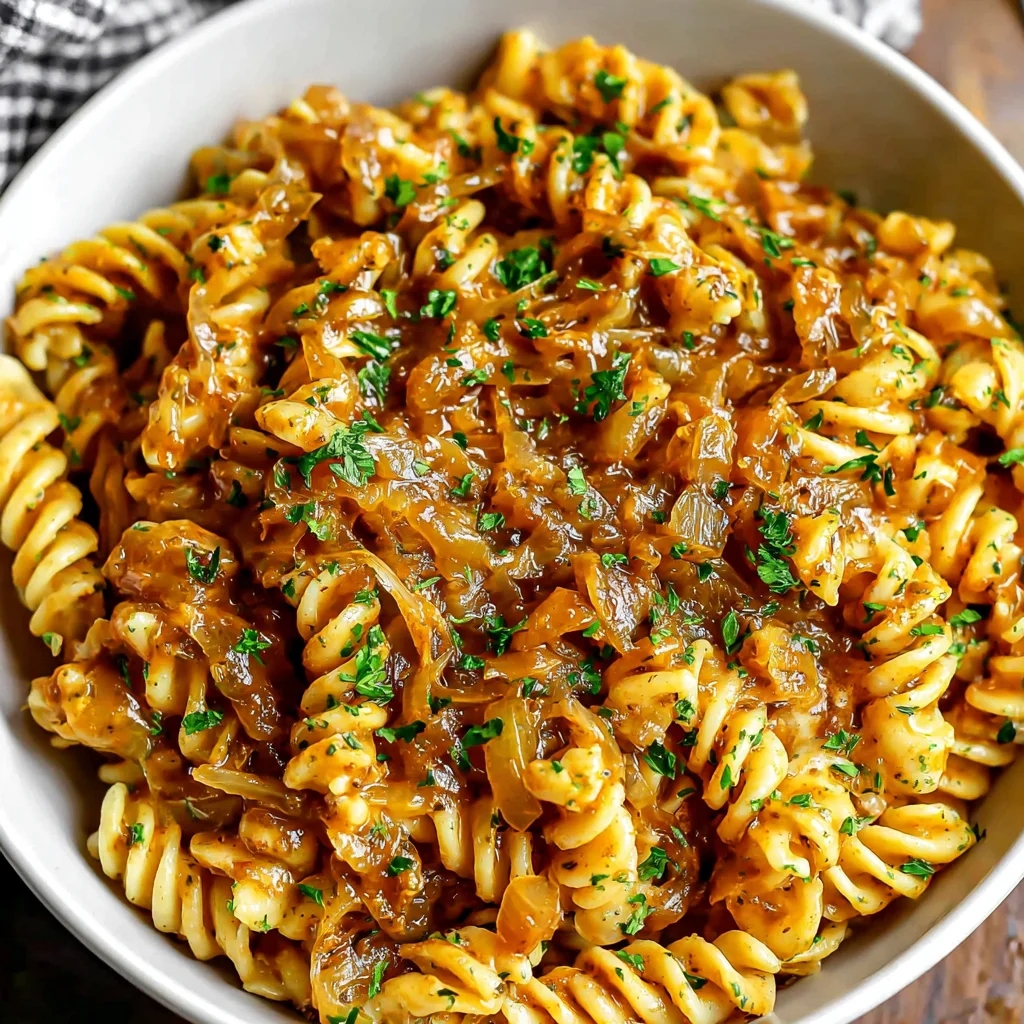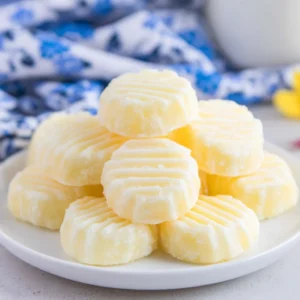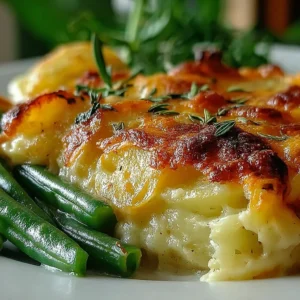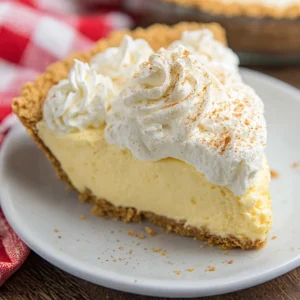French Onion Pasta. The very name conjures images of cozy evenings, rich aromas filling the kitchen, and a deeply satisfying meal that warms the soul. This isn’t your average pasta dish; it’s a symphony of sweet caramelized onions, savory beef broth, and the creamy melt of Gruyère cheese, all intertwined with perfectly cooked pasta. Forget simple weeknight dinners; this recipe elevates pasta to an entirely new level of deliciousness. It’s a dish that’s both elegant enough for a special occasion yet easy enough for a busy weeknight. The depth of flavor developed through the slow caramelization of the onions is truly remarkable, transforming a humble ingredient into a culinary star. Prepare yourself for a pasta experience unlike any other – one that will leave you wanting more.
Why You’ll Love This French Onion Pasta Recipe
This French Onion Pasta recipe isn’t just a meal; it’s an experience. What sets it apart from other pasta dishes? It’s the unparalleled depth of flavor, achieved through the meticulous caramelization of the onions. This process, while time-consuming, is the secret weapon that transforms this dish from good to extraordinary. The sweet, savory, and slightly tangy notes of the caramelized onions create a complex flavor profile that dances on your palate. It’s a flavor explosion that lingers long after the last bite.
Beyond the exceptional taste, this recipe is incredibly versatile. It’s easily adaptable to dietary needs and preferences. Feel free to experiment with different types of pasta, cheeses, and even add protein like cooked chicken or beef for a more substantial meal. The recipe’s forgiving nature makes it perfect for both seasoned cooks and kitchen novices. Moreover, the relatively simple technique – despite the caramelization – makes it surprisingly manageable, even on busy weeknights. It’s the kind of recipe that feels luxurious yet doesn’t require hours of complicated preparation. This recipe is a testament to the fact that sometimes, the most rewarding meals are the simplest.
Finally, this French Onion Pasta is remarkably satisfying. The combination of creamy cheese, hearty broth, and tender pasta creates a comforting and fulfilling experience. It’s the kind of dish that sticks with you, leaving you feeling nourished and content. It’s the perfect antidote to a long day or a chilly evening, offering warmth and comfort in every spoonful. And that’s truly invaluable. For a truly luxurious experience, pair this dish with a crisp glass of white wine (or a refreshing non-alcoholic beverage of your choice). This combination elevates the entire dining experience to another level. Try it – you won’t be disappointed!
Why You Should Try This French Onion Pasta Recipe
In a world of quick and easy meals, this French Onion Pasta recipe offers something truly special: a journey for your taste buds. It’s a chance to slow down, appreciate the process of cooking, and savor the incredible flavors that emerge from simple ingredients, expertly prepared. It’s a testament to the power of patience in the kitchen. The slow caramelization of the onions is not just a step; it’s a transformative process that unlocks a depth of flavor rarely found in other pasta recipes. It’s an investment of time that pays off exponentially in taste and satisfaction.
This recipe is perfect for impressing guests or simply treating yourself to a truly special meal. Its elegant presentation and rich, complex flavors will surely leave a lasting impression. It’s a dish that transcends the ordinary, showcasing the beauty of simple ingredients elevated by careful technique. The beautiful golden-brown color of the onions alone makes it a visually stunning dish, before you even take your first bite. This recipe is more than just food; it’s a culinary experience.
Beyond its culinary merits, this French Onion Pasta recipe encourages you to explore the joy of cooking. It teaches valuable skills, such as the art of caramelizing onions, a technique applicable to many other dishes. It’s a chance to connect with your food, understand its origins, and appreciate the craft of transforming basic ingredients into something truly exceptional. Whether you’re a seasoned chef or a beginner cook, this recipe is a rewarding challenge that will elevate your cooking skills and introduce you to a new level of culinary satisfaction. So, embrace the process, embrace the flavor, and embrace the joy of creating this culinary masterpiece.
Ingredients and Utensils for French Onion Pasta
This recipe for French Onion Pasta requires readily available ingredients, making it accessible to most home cooks. However, the quality of your ingredients will directly impact the final flavor, so prioritize using the best you can find. The caramelization of onions is a crucial element, and using high-quality onions will make all the difference. Let’s delve into the specifics:
Ingredients: A Detailed Look
- 3 large yellow onions, thinly sliced: The star of the show! Yellow onions offer the perfect balance of sweetness and sharpness when caramelized. Use a sharp knife and mandoline slicer (highly recommended) to ensure consistent, thin slices for even caramelization. Avoid using red onions, as they tend to retain their sharpness even after long cooking times.
- 4 tablespoons butter: Provides richness and helps in the caramelization process. Unsalted butter is preferred so you can control the salt level in the dish. Consider using high-quality European butter for an enhanced flavor. Clarified butter is also a good option for higher smoke points.
- 1 teaspoon sugar: Helps to draw out the natural sugars in the onions and accelerates the caramelization process, resulting in a richer, deeper flavor. Granulated white sugar is best for this purpose.
- 1/2 teaspoon salt: Enhances the flavors of the onions and the overall dish. Adjust to your taste preference. Kosher salt is generally recommended for its larger crystals and even distribution.
- 1/4 teaspoon black pepper: Adds a touch of spice and complexity. Freshly ground black pepper is always preferred for its superior aroma.
- 1/2 cup dry white wine (optional, can substitute with chicken broth): Adds depth and complexity to the flavor profile. A dry white wine like Sauvignon Blanc or Pinot Grigio works well. If you prefer to omit alcohol, chicken broth provides a decent substitute though the flavor profile will be slightly less complex.
- 4 cups beef broth: Provides the liquid base for the sauce. Use low-sodium beef broth to control the salt level. Homemade broth adds incredible depth of flavor if you have time.
- 1 tablespoon tomato paste: Adds a subtle depth and umami flavor to the sauce. Avoid using too much as it can overpower the subtle sweetness of the onions.
- 1 teaspoon dried thyme: Adds an earthy, herbaceous note. Fresh thyme can be substituted (use about 2 tablespoons), but dried thyme is more convenient.
- 1 bay leaf: Infuses the broth with a subtle aromatic complexity. Remember to remove the bay leaf before serving.
- 1 pound pasta (penne, rigatoni, or your favorite shape): Choose a pasta shape that can hold the sauce well. Penne, rigatoni, and fusilli are excellent choices.
- 1/2 cup grated Gruyere cheese (or Swiss cheese): The creamy, nutty flavor of Gruyère perfectly complements the caramelized onions. Swiss cheese makes a good substitute, offering a similar nutty profile.
- 2 tablespoons chopped fresh parsley (optional, for garnish): Adds a touch of freshness and vibrancy to the finished dish.
Utensils: Your Essential Kitchen Tools
- Large pot or Dutch oven: A large pot or Dutch oven is crucial for caramelizing the onions and cooking the pasta. The larger surface area ensures even cooking and prevents overcrowding.
- Wooden spoon or spatula: Essential for stirring the onions during caramelization and preventing sticking. A heat-resistant silicone spatula is a good alternative.
- Sharp knife and cutting board: For efficiently slicing the onions. Using a mandoline slicer is highly recommended for ensuring thin, even slices.
- Measuring cups and spoons: For accurate measuring of ingredients.
- Grater: For grating the Gruyère cheese.
- Ladle: Useful for easily serving the pasta.
- Colander: For draining the pasta.
Detailed Recipe Steps for French Onion Pasta
Now, let’s embark on the journey of creating this incredible French Onion Pasta dish. Remember, patience is key, especially during the crucial onion caramelization stage. This is where the magic happens!
Step 1: Caramelizing the Onions – The Foundation of Flavor
Melt the butter: In your large pot or Dutch oven, melt the butter over medium heat. Don’t rush this; let the butter melt gently and evenly.
Add the onions, sugar, salt, and pepper: Once the butter is melted, add the thinly sliced onions, sugar, salt, and pepper. Stir well to coat the onions evenly with the butter and seasoning.
The caramelization process: This is the most crucial and time-consuming step. Cook the onions, stirring occasionally, for 20-30 minutes, or even longer, until they are deeply caramelized and golden brown. Reduce the heat if they start to brown too quickly; you want a slow, even caramelization for maximum flavor development. The onions will release their natural sugars, creating a rich, sweet, and savory flavor profile.
Step 2: Deglazing (Optional) – Extracting Hidden Flavors
If you’re using white wine, this is your chance to enhance the flavors even further.
Add the wine: Once the onions are caramelized, add the white wine to the pot.
Scrape the bottom: Using your wooden spoon or spatula, scrape the bottom of the pot to loosen any browned bits from the caramelization process. These bits are packed with flavor!
Simmer: Let the wine simmer for a few minutes, allowing it to slightly reduce. This step adds another layer of complexity to the sauce.
Step 3: Building the Flavorful Broth
Add the broth and seasonings: Stir in the beef broth, tomato paste, thyme, and bay leaf. Bring the mixture to a gentle simmer. Make sure the bay leaf is fully submerged in the liquid.
Simmer gently: Let the mixture simmer for about 5-10 minutes, allowing the flavors to meld and deepen. The tomato paste will help to thicken the sauce slightly.
Step 4: Cooking the Pasta – Al Dente Perfection
Add the pasta: Add the pasta to the pot. Stir gently to ensure the pasta is evenly distributed in the broth.
Cook to al dente: Cook the pasta according to the package directions, stirring occasionally, until it’s perfectly al dente. The pasta will absorb some of the liquid, creating a creamy consistency.
Step 5: Melting the Cheese – Creamy Indulgence
Remove the bay leaf: Before adding the cheese, remove the bay leaf. Discard it carefully.
Stir in the cheese: Stir in the grated Gruyère cheese (or Swiss cheese). Continue stirring until the cheese is completely melted and the sauce has reached a creamy consistency. If the sauce is too thick, you can add a splash of water or broth to adjust.
Step 6: Serving Your Masterpiece
Serve immediately: Serve the French Onion Pasta immediately. The best flavor is experienced while the cheese is still melted and creamy.
Garnish (optional): Garnish with chopped fresh parsley, if desired, for a touch of vibrant color and freshness.
Tips, Variations, and Troubleshooting for French Onion Pasta
This recipe is incredibly versatile, but here are some tips and tricks to make it even better and avoid common pitfalls:
Ingredient Alternatives
- Pasta: Experiment with different pasta shapes – linguine, fettuccine, or even farfalle would work well.
- Cheese: Fontina, provolone, or even a blend of cheeses can be used instead of Gruyère.
- Broth: Vegetable broth can be used for a vegetarian version. Chicken broth also works.
- Wine: Omit the wine or substitute with an equal amount of chicken broth.
- Vegan adaptation: Use vegan butter and a plant-based cheese substitute. Vegetable broth is essential.
- Gluten-free version: Use gluten-free pasta.
Avoiding Common Mistakes
- Don’t rush the caramelization: This is crucial for developing the deep flavor of the onions. Be patient and let the onions cook slowly.
- Don’t overcrowd the pan: If you overcrowd the pan, the onions will steam instead of caramelize. Cook them in batches if necessary.
- Don’t overcook the pasta: Cook the pasta al dente to ensure it maintains its texture and doesn’t become mushy.
- Adjust seasoning to taste: Seasoning is crucial. Taste the sauce as you go and adjust the salt and pepper accordingly.
Nutritional Values and Health Benefits of French Onion Pasta
(Note: The following nutritional information is an approximation and may vary depending on the specific ingredients used. It’s best to use a nutrition calculator with your exact ingredients for precise values.)
A typical serving of French Onion Pasta contains approximately:
- Calories: 450-550 calories per serving
- Protein: 15-20 grams per serving
- Fat: 20-25 grams per serving
- Carbohydrates: 50-60 grams per serving
Health Benefits:
- Onions: Rich in antioxidants and have anti-inflammatory properties.
- Beef broth: Provides electrolytes and may contain beneficial nutrients, depending on the broth’s ingredients.
- Gruyere cheese: A good source of calcium and protein.
- Thyme: Has antioxidant and antimicrobial properties.
- Pasta (depending on type): Provides carbohydrates for energy. Whole wheat pasta offers additional fiber.
FAQs
Can I use frozen onions in this French Onion Pasta recipe?
What kind of pasta works best with French Onion Pasta?
Is this French Onion Pasta recipe gluten-free?
Can I make this French Onion Pasta ahead of time?
What can I substitute for Gruyere cheese?
Conclusion: Embrace the Flavor of French Onion Pasta
This French Onion Pasta recipe is more than just a meal; it’s a culinary adventure, a testament to the transformative power of slow cooking and simple, high-quality ingredients. The deeply caramelized onions form the heart of this dish, adding a complex sweetness and savoriness that elevates the entire experience. It’s a recipe that rewards patience and precision, resulting in a truly unforgettable and comforting dish. From the initial slow caramelization to the creamy cheese finish, every step contributes to the final masterpiece.
We encourage you to try this recipe and share your experience in the comments below. Don’t hesitate to experiment with variations – perhaps adding some sautéed mushrooms or different herbs. Let us know how you adapted the recipe and what you thought of the final result. And don’t forget to share this delicious recipe with your friends and family. Happy cooking!
For more delicious recipes and cooking inspiration, check out our other recipes on Cocina Facilita! You might also enjoy our Chewy Pumpkin Spice Cookies for a delightful autumnal treat. And if you’re looking for a festive dessert, our Praline Pumpkin Pie is sure to impress.
Pin this recipe to your Pinterest board!
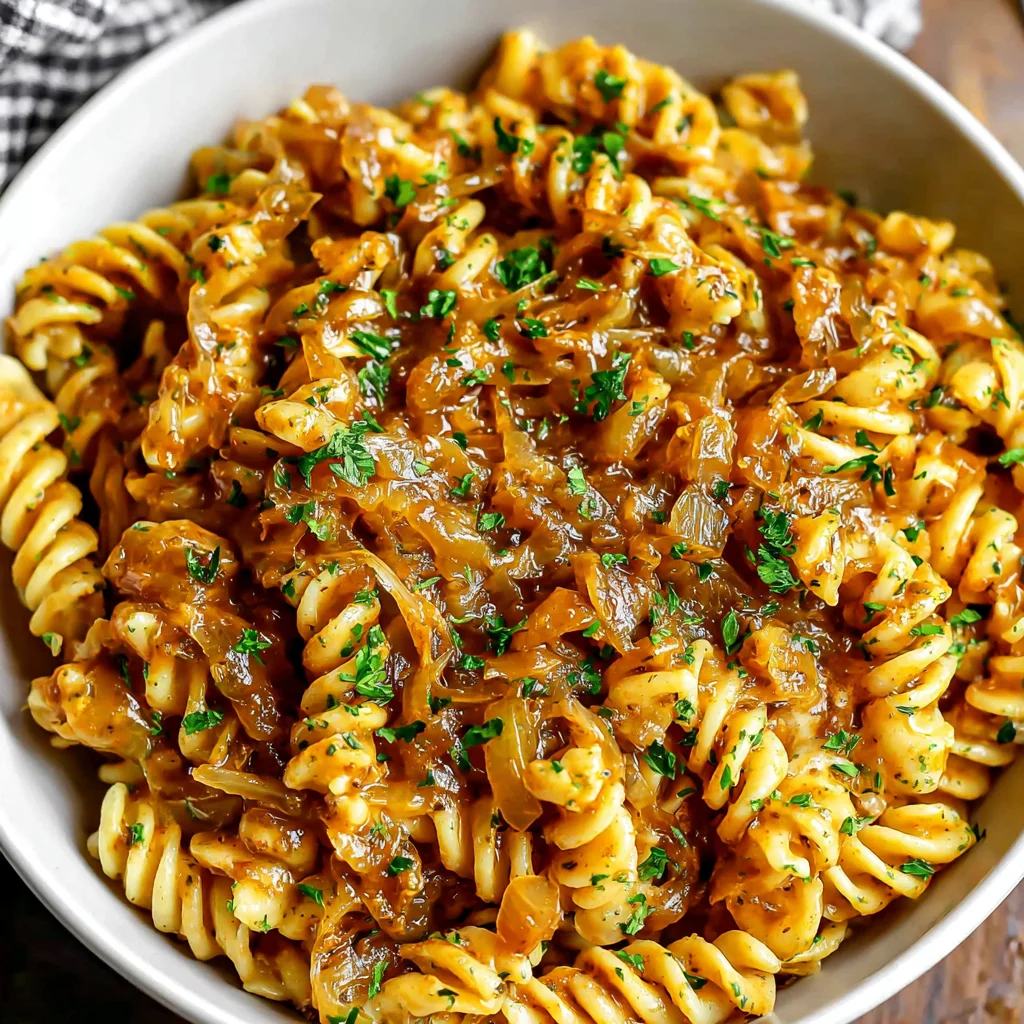
French Onion Pasta
Ingredients
Equipment
Method
- Caramelize the onions: Melt butter in a large pot over medium heat. Add onions, sugar, salt, and pepper. Cook, stirring occasionally, 20-30 minutes, until deeply caramelized and golden brown. Lower heat if browning too quickly.
- Deglaze (optional): If using wine, add it to the pot and scrape up browned bits. Simmer until slightly reduced. Omit if skipping wine.
- Add broth and seasonings: Stir in beef broth, tomato paste, thyme, and bay leaf. Bring to a simmer.
- Cook pasta: Add pasta to the pot. Cook according to package directions, stirring occasionally, until al dente. The pasta will absorb some of the liquid.
- Stir in cheese: Remove bay leaf. Stir in Gruyere cheese until melted and creamy.
- Serve: Serve immediately, garnished with fresh parsley (optional).
